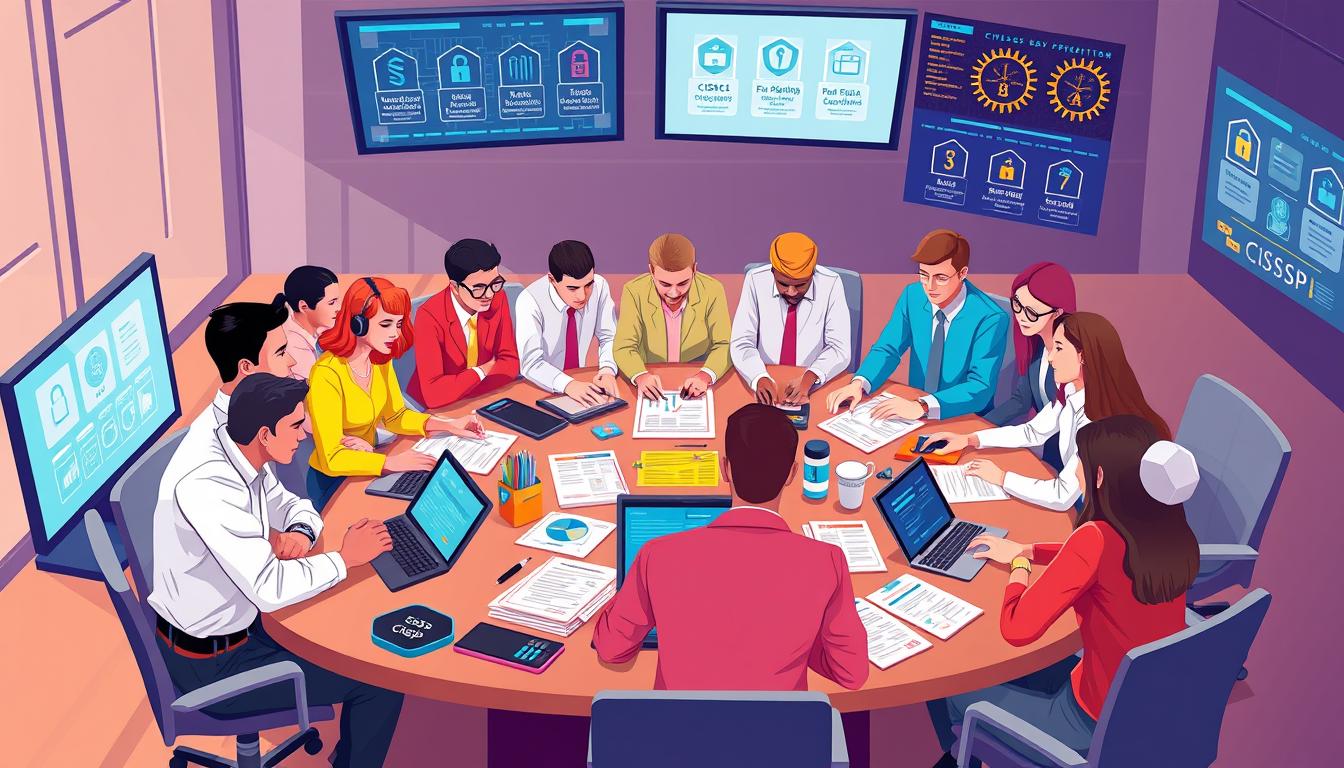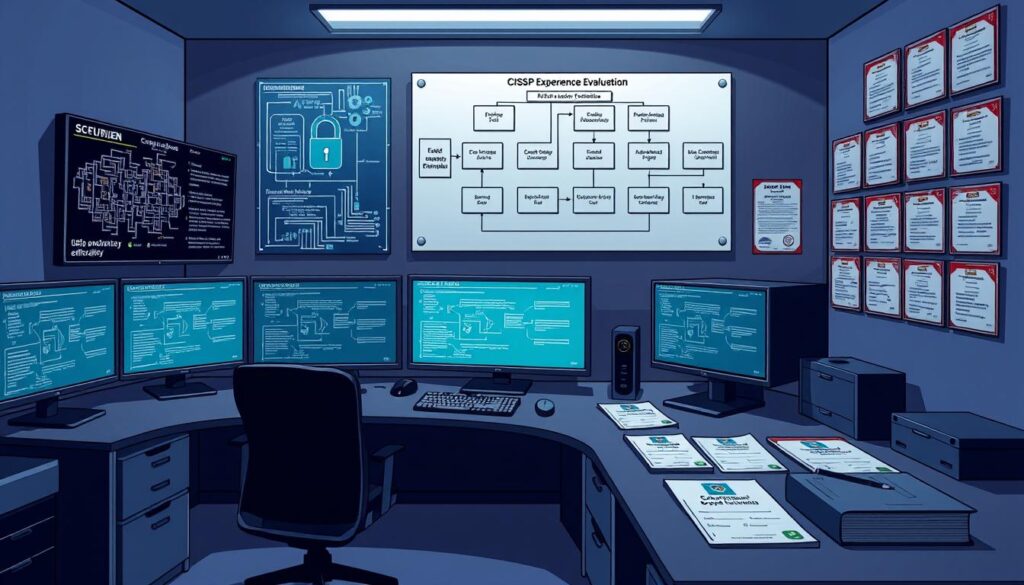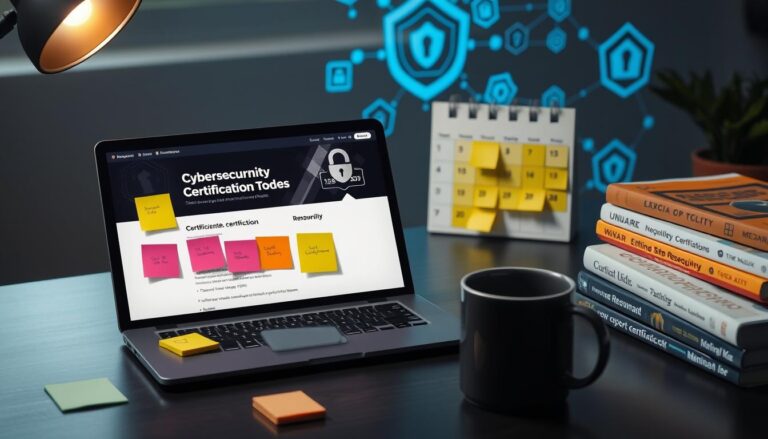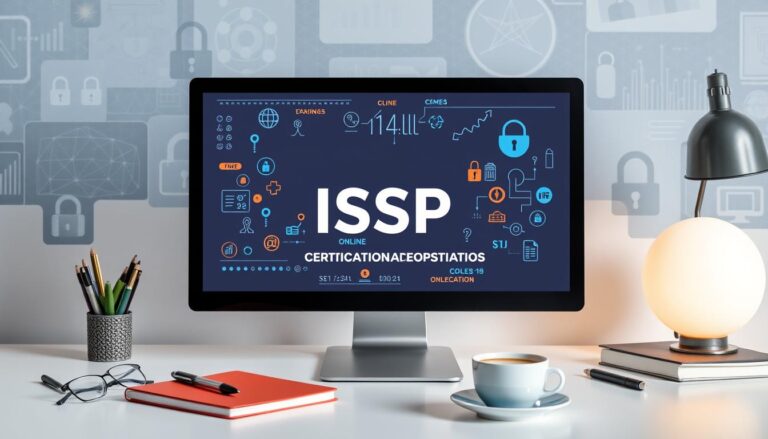
Did you know that about 85% of CISSP candidates fail on their first try? To get the CISSP certification, you need at least five years of work experience. This experience must be in two or more of the eight domains in the CISSP Common Body of Knowledge (CBK).
Understanding the CISSP experience requirements is key. It’s not just about passing the application. It’s about knowing what you need to qualify for the CISSP certification. This article will guide you through the minimum requirements and how your past roles fit the ISC2 standards.
Starting your journey to CISSP certification can be exciting. Every step you take towards meeting these requirements brings you closer to this prestigious title.
Understanding the CISSP Certification
The CISSP certification is a top honor in the world of information security. It shows you know a lot about keeping data safe, including managing risks and setting up security rules. The test is tough, with 250 questions over six hours. You need to score 700 out of 1000 to pass.
Getting the CISSP shows you’re good at creating and managing security plans. You need at least five years of work experience in two of the eight CISSP domains. These domains cover important areas like managing risks and keeping assets safe.
The value of the CISSP is huge, as many jobs want you to have it. People with the CISSP can make about 25% more than those without it. It also opens doors to better jobs, like Security Architect or Chief Information Security Officer.
To keep your CISSP, you must keep learning. You need 20 Continuing Professional Education (CPE) credits every year, or 120 in three years. There’s also an Annual Maintenance Fee (AMF) of USD $135. This keeps your certification current and respected in the field.
What Are the CISSP Experience Requirements?
To get CISSP certification, you must meet certain experience needs. These needs focus on both deep and wide knowledge in security. You need at least five years of full-time work experience in two or more of the eight domains in the CISSP Common Body of Knowledge (CBK).
Minimum Years of Experience Needed
The CISSP work experience criteria offer different ways to meet the five-year requirement. Getting a post-secondary degree can cut this down by a year. Also, if you have an approved ISC2 credential, you might get a one-year waiver. But, you must have at least four years of paid, full-time work experience to qualify for CISSP certification.
Accumulating Experience Across Domains
To meet CISSP experience eligibility criteria, you need to gain experience in various domains. For example, in Security and Risk Management and Security Architecture and Engineering. It’s key to document how your roles fit these domains to prove your CISSP certification experience. Even part-time work counts, as long as you work 20 to 34 hours a week. There are rules to convert part-time hours into full-time equivalents.
| Work Category | Hours per Week | Experience Credited |
|---|---|---|
| Full-Time | 35 hours and above | 1 month of experience per 4 weeks |
| Part-Time | 20 to 34 hours | 1,040 hours equal 6 months of full-time experience |
CISSP Experience Requirements Breakdown
Understanding the CISSP experience criteria helps you match your career with the certification’s needs. Knowing both full-time and part-time rules is key to meeting CISSP experience qualifications.
Full-Time Work Experience Criteria
To meet full-time experience needs, you need at least five years of experience in the CISSP’s eight security domains. Working 35 hours a week for four weeks counts as one month. This way, you can build your skills step by step.
Part-Time Work Experience Guidelines
For part-time, you must work between 20 to 34 hours a week. 1,040 hours of part-time work equals six months of full-time. 2,080 hours is one year of full-time work. Keeping detailed records of your part-time work is important for proving your experience.
Showing how your work fits the CISSP’s security domains is critical. Being able to gather and present this information is essential for passing the certification.
| Work Type | Hours per Week | Experience Accumulation |
|---|---|---|
| Full-Time | 35 hours and above | 1 month of experience for every 4 weeks |
| Part-Time | 20 to 34 hours | 1,040 hours = 6 months, 2,080 hours = 1 year |
Can Internships Count Toward CISSP Experience?
When you’re going for the CISSP certification, knowing how internships help is key. Internships are a great way to get real-world experience in info security. You can do them for pay or not. Doing tasks in at least two CISSP domains can help meet your experience needs.
Paid vs Unpaid Internships
Paid and unpaid internships both count toward CISSP experience. It’s important to document your internship well. This includes:
- A confirmation letter from the employer or organization, printed on official letterhead.
- Details on the specific tasks and responsibilities undertaken during the internship.
Having good internship documentation helps a lot when applying for CISSP. It shows you meet the experience needs. Make sure your internship fits with the CISSP domains to help your career in info security.
Approved Credentials That Can Waive Experience
Getting the CISSP certification is a big step in your career. Knowing how approved credentials can help is key. With the right certifications or degrees, you might get a year off the usual five-year experience need. This makes getting certified easier.
How Certifications Affect Requirements
Having the right certifications for CISSP is important. If you have an (ISC)² credential or a related degree, you can skip a year of experience. But, getting more certifications won’t add more years off. This rule helps you focus on growing professionally.
Examples of Approved Certifications
Many certifications can help you waive experience. Here are a few:
- AWS Certified Security – Specialty
- Certified Information Security Manager (CISM)
- Certified Ethical Hacker (CEH)
- CompTIA Security+
- Cisco Certified Network Associate Security (CCNA Security)
Check out over 50 ISC2 approved certifications. See how your current credentials can speed up your CISSP journey.
| Certification | Issuing Organization | Experience Waiver |
|---|---|---|
| AWS Certified Security – Specialty | Amazon | 1 Year |
| Certified Information Security Manager (CISM) | ISACA | 1 Year |
| Certified Ethical Hacker (CEH) | EC-Council | 1 Year |
| CompTIA Security+ | CompTIA | 1 Year |
| Cisco Certified Network Associate Security (CCNA Security) | Cisco | 1 Year |
How ISC2 Evaluates Work Experience
ISC2 looks at your work experience based on what you did, not just your job title. This way, you can show how your job fits into the CISSP eight domains. It makes it easier to meet the ISC2 work experience criteria.
Relevance Over Job Titles
Job titles don’t always tell the whole story. ISC2 wants to see how your job fits into the security domains in CISSP. Talk about specific projects and tasks that show your skills in areas like risk management and security architecture. This is key for a good CISSP experience evaluation.
Knowing the Eight Domains of CISSP
Knowing the CISSP eight domains is important. The domains are:
- Security and Risk Management
- Asset Security
- Security Architecture and Engineering
- Communication and Network Security
- Identity and Access Management
- Security Assessment and Testing
- Security Operations
- Software Development Security
Understanding these domains helps you show how your experience fits. This makes your CISSP application stronger.

| CISSP Domain | Percentage of Exam Weight |
|---|---|
| Security and Risk Management | 16% |
| Asset Security | 10% |
| Security Architecture and Engineering | 13% |
| Communication and Network Security | 13% |
| Identity and Access Management | 13% |
| Security Assessment and Testing | 12% |
| Security Operations | 13% |
| Software Development Security | 10% |
CISSP Experience Eligibility for Associates
The CISSP certification is a great way to show your cybersecurity skills. If you pass the CISSP exam but don’t have enough experience, you can get the CISSP Associate status. This lets you show your knowledge while you work on getting the full certification.
Transition from Associate to Full Certification
Being a CISSP Associate starts your journey to full certification. You need at least five years of work experience in two CISSP domains. If you have a degree or another approved certification, you can get certified in four years instead.
Your experience must meet certain rules:
- Working 35 hours a week for four weeks equals one month of experience.
- Working 20 to 34 hours a week can count too. 1040 hours equals six months, and 2080 hours equals twelve months.
- Internships, paid or unpaid, are okay if they match CISSP domains.
You have six years after passing the exam to get the needed experience. You must score 700 out of 1000 on the exam and complete endorsement applications. This usually takes four to six weeks.
To keep your CISSP or Associate certification, you must keep learning. You need 120 Continuing Professional Education (CPE) credits every three years. You must earn at least 40 CPE credits each year to keep your certification.
CISSP Experience Guidelines for Different Roles
It’s key to know how your experience fits with CISSP certification needs. Whether you’re in management or technical roles, your experience can help meet CISSP guidelines. Each role offers unique insights into security practices and principles.
Management and Oversight in Security
In security management roles, your experience is very valuable for CISSP requirements. Jobs like information security managers or security program directors oversee key security protocols and risk assessments. They handle tasks like:
- Implementing security protocols.
- Conducting compliance management.
- Aligning security initiatives with organizational goals and CISSP domains.
Candidates need to show a strong grasp of security management. This role shows you can manage security programs well, using your security engineering experience.
Technical Roles in Security Environment
Technical roles like security analysts, system administrators, or network engineers are key to strong security in an organization. Your experience in these roles helps meet CISSP requirements. Focus on:
- Understanding and applying security measures across the eight CISSP domains.
- Hands-on experience dealing with security challenges.
- Problem-solving capabilities in technical security contexts.
Your ability to show practical security measures is critical. Roles in this category should highlight experiences that clearly relate to security practices. This will help validate your CISSP experience and support your certification application.
Calculating Your Experience: Full-Time vs Part-Time
It’s important to know how to calculate CISSP experience. The rules for full-time and part-time work differ. Knowing these rules helps you plan better for your CISSP certification.
Full-Time Experience Calculation
Full-time work earns you experience every month. You need 140 hours of work to count as one month. This means working 35 hours a week for four weeks.
You need five years of work experience to get certified. This experience must be in at least two of the eight CISSP domains. If you have a college degree, it can count as one year of experience. This means you only need four years of work experience.
Part-Time to Full-Time Conversion Ratio
If you work part-time, you need to know how to convert your hours. The (ISC)² says 1,040 hours of part-time work is like six months of full-time. 2,080 hours is like a full year of full-time work.
This rule helps people with part-time jobs get certified. You can work 20 to 34 hours a week. This way, you can earn valuable experience while working part-time.
| Work Experience Type | Hours Required | Equivalent Full-Time Experience |
|---|---|---|
| Full-Time | 35 hours/week for 4 weeks | 1 month |
| Part-Time | 1,040 hours | 6 months |
| Part-Time | 2,080 hours | 12 months |

CISSP Experience Standards for Employers
When you go for the CISSP certification, you need to show your work experience. The right documentation for CISSP is key in the application process. You’ll need letters or forms from your employers that list your job, duties, and how long you worked there. These should be on official letterhead to look more official.
Documentation of Experience
It’s important to document your work experience correctly. Employer verification is a big part of this. Your employers should write detailed letters about your job experience. Make sure these letters include:
- Title of position held
- Duration of employment
- Specific roles and responsibilities
- Domains of CISSP addressed during employment
Having good documentation makes your application smoother. It also makes sure you meet the CISSP exam’s requirements.
Employer Support for Certification Applications
Your employer’s help can really boost your chances of getting certified. This employer support CISSP means more than just paperwork. It’s about getting guidance in areas that match the CISSP’s eight domains. Employers can also help you grow in cybersecurity, showing off your skills.
Also, a good word from your employer can speed up the process. It can make you stand out more.
Common Misconceptions About CISSP Experience Requirements
Many people think wrong about what’s needed for the CISSP certification. They often believe you must have a job title that says “security.” But, (ISC)² really cares about your experience in the eight domains, not just job titles. This means you can come from many different roles and backgrounds.
Experience Not Necessarily in a Security Role
You don’t need a job in security to get the CISSP. Roles like project management, compliance, or IT support can help too. It’s about the skills you have, not just your job title. This way, you can show how you apply cybersecurity principles, even if you’re not in a security job.
Importance of Diverse Experience
Having a mix of experiences is key for the CISSP. Working in different areas helps you solve problems better and understand security challenges. Employers like this because it makes you a more complete cybersecurity expert in a changing world.
Conclusion
Understanding the CISSP experience requirements is key for those aiming for CISSP certification. Candidates need at least five years of paid work experience in two of the eight cybersecurity domains. If you have a related four-year degree, you might get a one-year waiver.
When planning for CISSP certification, remember your work experience must match the CISSP domains. Also, having certifications like CompTIA Security+ or CISA can help. These can make your path to certification easier.
Getting the CISSP certification proves your skills and boosts your career in cybersecurity. With cyber threats growing, having CISSP shows you’re ready to handle complex security issues.
Source Links
- Understanding CISSP Experience Requirements: A Comprehensive Guide
- CISSP Exam Outline
- How to Earn the CISSP Certification (Training & Requirements)
- CISSP Exam Requirements
- CISSP Exam Requirements & Prerequisites: Eligibility and Work Experience
- CISSP Experience Requirements
- What Counts As CISSP Experience?
- EXPERIENCE COUNTS
- CISSP certification cost and requirements (2024) | Essential information
- CISSP Exam Requirements | Eligibility, Cost, Skills & Experience
- The CISSP experience waiver [updated 2022]
- CISSP Certification & Requirements – Complete Guide (2024)
- Breaking Down the CISSP Experience Requirements
- Exam Scoring FAQs | ISC2
- CISSP Certification Frequently Asked Questions
- Learn What to Study for the ISC² CISSP Examination
- CISSP REQUIREMENTS GUIDE
- Meeting the experience requirement – ISC2 Certified Information Systems Security Professional (CISSP) (2024) Cert Prep Video Tutorial | LinkedIn Learning, formerly Lynda.com
- The Common Myths Surrounding CISSP Certification Debunked – BridgingMinds Network
- Debunking Common CISSP Certification Myths
- Steps to Become CISSP (Certified Information Systems Security Professional)
- My CISSP experience
- CISSP Certification: Elevating Cybersecurity Mastery



